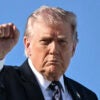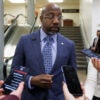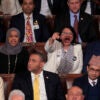The May summit between President Donald Trump and Vietnamese Prime Minister Nguyen Xuân Phúc demonstrated the extent of warming relations between Vietnam and the U.S.
Over the past two decades, U.S.-Vietnam relations have been relatively stable with converging interests in economics, military affairs, and geopolitics. This relationship will prove to be particularly important as both countries contend with China’s expansion in the South China Sea.
Hours after meeting with Trump, Phúc spoke at The Heritage Foundation about Vietnamese-American relations and Vietnam’s security concerns.
During his speech, the prime minister touched on several shared U.S.-Vietnamese interests. He commended the trading of technology and produce, the signing of $15 billion in contracts, the investing of $10 billion to American projects in Vietnam, and the expanding of tourism and education.
According to U.S. Commerce Secretary Wilbur Ross, part of the deals included a $3.4 billion investment in goods manufactured in the U.S. that support 23,000 jobs.
The prime minister also mentioned that investments between the two countries continue to be signs of good relations, with 850 American projects already in Vietnam worth over $10 billion and Vietnam-issued licenses making way for $50 to $70-million projects in America.
Converging military interests are also bringing the two nations closer, despite their embattlement in the Vietnam War decades ago.
The White House announced that the U.S. and Vietnam pledged to strengthen defense ties under the 2011 Memorandum of Understanding on Advancing Bilateral Defense Cooperation and the 2015 Joint Vision Statement on Defense Relations.
One of the most noticeable agreements in recent months is the delivery of six patrol boats and a decommissioned U.S. Coast Guard Hamilton-class cutter. More measures to expand maritime security have also been in the talks between the two countries.
As for humanitarian issues, Phúc advocated for “accelerated humanitarian cooperation to address [the] consequences of war” through continued cooperation in areas such as decontamination, extraction of explosives, and investigation of missing soldiers.
The U.S. and Vietnam have long cooperated in the accounting for American servicemen missing from the Vietnam War.
One topic the prime minister did not address was the issue of human rights for Vietnamese citizens.
According to the State Department, Vietnam has a poor track record with its restrictive policies on speech, its poor judicial system, and inhumane police treatment.
Many Vietnamese activists urged Trump to address arbitrary arrests and beatings of citizens like bloggers defending land-rights and Catholic priests protesting the Formosa Plastics Corp. environmental disaster.
Prior to the prime minister’s visit, however, the U.S. and Vietnam did hold human rights dialogues in Hanoi—something that would not be possible without a broader, positive relationship.
The United States and Vietnam have intersecting interests across a range of issue areas. The two nations should seek to develop those common interests through continued economic, cultural, military, and humanitarian engagement.































